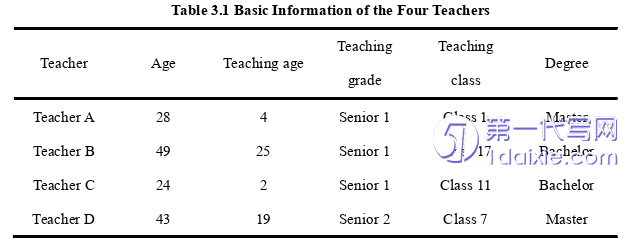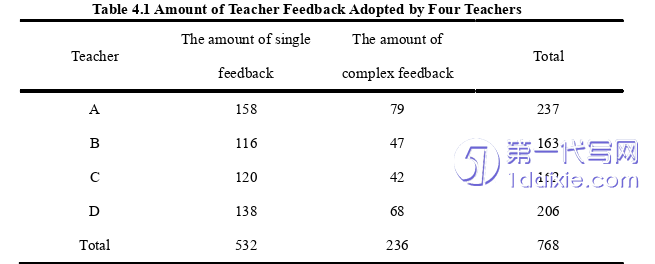本文是一篇英语论文,本研究通过Excel和SPSS对所得数据进行分析,结果表明教师在英语教学中普遍选用单一型反馈,但混合型反馈更能够提升学生口语输出的复杂度、流利度和准确度,学生能够说出更多的复杂句,且句子中包含极少的犹豫、重复和重述,同时他们句子的准确性也更高。
Chapter One Introduction
1.1 Background of the Study
The famous educator Makarenko once said: “The same teaching method may differ by 20 times because of the different usage of language. Besides, the language accomplishment of teachers determines the efficiency of students’ mind work in the classroom to a great extent (cited from Zhao, 1998).” The classroom discourse of English teachers is not only a means or tool for organizing classroom teaching, but also one of the main sources of information for students to obtain comprehensible target language input (Nunan, 1991). In the English class, teachers’ discourse plays a very important role. It can not only organize and regulate the classroom teaching, but also an essential resource for our learners to absorb language and internalize knowledge. Its quality directly affects the teaching effect and the cultivation of students’ language ability (Lv et al., 2015). Therefore, teacher feedback, which is an essential part of teacher discourse, is of great significance.
With the deepening of educational reform, the student-centered teaching model is widely used by front-line teachers. The National English Curriculum Standard (2017 ed., 2020 revision) points out that the English curriculum has a key educational function and aims to develop students’ core literacy of English discipline, which contains language ability, cultural awareness, thinking quality and learning competence. Teachers should shift from focusing only on students’ academic achievement to “morality education”, from focusing on language analysis and explanation to students’ ability to use English to solve problems in specific situations (MOE of PRC, 2020).

1.2 Significance of the Study
1.2.1 Theoretical Significance of the Study
In theory, the purpose of this research is to explore the impacts of different teacher feedback on students’ oral output by observing the use of feedback applied by different English teachers. Many experts have conducted numerous research on teacher discourse and classroom feedback from many perspectives, such as the comparative study of peer feedback and teacher feedback, the impact of corrective feedback on students’ English writing, and the exploration of the mother tongue mediation function of teachers’ written feedback. The research on writing teaching is particularly in-depth. However, there is a lack of relevant studies on the impact of English classroom teacher feedback on students’ oral output. After reading the literature, the author understands the importance of teacher feedback in classroom teaching, which can affect students’ classroom participation and teachers’ teaching ability. On this basis, the author will further explore the impacts of teacher feedback on students’ oral output, so as to enrich relevant research on teacher feedback, open up new research perspectives, and provide front-line teachers with some effective teaching concepts.
1.2.2 Practical Significance of the Study
In this thesis, classroom observation and questionnaire are used to conduct an in-depth study on the status quo of the usage of teacher feedback among English teachers in senior high and its impact on students’ oral output. Through the analysis of the collected data, it can help provide the front-line teachers with some specific and practical teaching suggestions about their feedback. At the same time, from the perspective of students, it can be understood that how to promote the enthusiasm of students’ classroom interaction, so as to better improve students’ learning efficiency and learning ability. Therefore, the research in this thesis can provide a certain degree of practical guidance for English education in senior high schools, and can offer the data support for the development and improvement in the field of education and teaching to some extent.
Chapter Two Literature Review
2.1 Teacher Feedback
2.1.1 Definitions of Teacher Feedback
Teacher feedback is an indispensable section of learners’ comprehensible input and also effectively promotes students’ language output. Different scholars understand the connotations of teacher feedback from different levels.
As early as 1975, Sinclair and Coulthard (1975) propose the most classic IRF model in linguistic theory, which consists of three steps, namely initiation, response and feedback. It can be used to analyze the classroom conversation structure between teachers and students. They believe that teacher feedback occurs in the last step of this model, and it is the teacher’s evaluation based on the actual performance of students in the classroom. Seliger (1983) believes that teacher feedback refers to teachers’ oral response to learners in the procedure of language acquisition from the research aspect of second language acquisition. Only in this way, can they timely check their comprehension about the target language. From the perspective of classroom interaction, Ellis (2005) holds that teacher feedback is mainly teachers’ response which is used to communicate with students. Ur (2000) points out that in the language teaching environment, teacher feedback usually refers to the information sent back by teachers in order to show the completion of a certain learning task and can improve the needs of students. Wiseman and Hunt (2001) believe that teacher feedback is the teachers’ message produced in speaking or written form delivering to students, so that students can understand the conditions of their learning process.
2.2 Students’ Oral Output
2.2.1 Definitions of Students’ Oral Output
Jin Honggang (2017) holds the opinion that students’ language output can be further subdivided into two categories: oral output and written output. Oral output can also be understood as oral expression, that is, the speaker of the language gives a speech or makes an oral presentation to one or several audiences. Such oral expressions include: (1) announcements (message, knowledge, etc.); (2) oral coherent narratives (conference statement, university speeches, etc.); (3) reading aloud of written articles; (4) producing speaking reports on the basis of notes; (5) remarks on visual information (paintings, charts, etc.); (6) playing a role that has been rehearsed; (7) singing (Zhang & Wang, 2013).
Richards and Lockhart (2000) argue that output is a kind of language produced by students. Jin Honggang (2001) further points out that effective oral output is closely related to key structure, correct meaning and successful communicative function. Based on the above descriptions and the research direction of this paper, the author mainly discusses the effective oral English output in high school English classroom teaching, while the ineffective oral English output or Chinese output is omitted.
To sum up, oral output means that the speaker expresses what he thinks in his heart and what he intends to say through oral expressions. It can be expressed in many ways, such as reading aloud, retelling, answering other people’s questions, looking at pictures and analyzing, talking to oneself, speeches, discussions, etc. The objects vary from one person to many people.
Chapter Three Methodology ........................... 22
3.1 Research Questions ...................................... 22
3.2 Research Participants ........................................... 22
3.3 Research Instruments .............................. 23
Chapter Four Results and Discussions .............................. 30
4.1 Characteristics of the Use of Teacher Feedback in High School English Teaching at Present ....................... 30
4.1.1 Amount of Teacher Feedback Adopted by Four Teachers ................... 30
4.1.2 Distributions of Teacher’s Single Feedback and Teacher’s Complex Feedback ............................... 31
Chapter Five Conclusion......................................... 54
5.1 Major Findings of this study .......................... 54
5.2 Pedagogical Implications of this Study..................... 56
5.3 Limitations of this Study ......................... 58
Chapter Four Results and Discussions
4.1 Characteristics of the Use of Teacher Feedback in High School English Teaching at Present
In order to explore the status quo of the use of teacher feedback in high school English teaching, the author transcribes the audio-recordings into texts and makes qualitative and quantitative analysis of them.
4.1.1 Amount of Teacher Feedback Adopted by Four Teachers
This study collects the data of 20 English lessons from four English teachers in Grade 1 and Grade 2 in high school, and transcribes them into written materials through the voice recorder. Combining with the classroom observation scale, it can present the information of the use of single and complex feedback by the four participants. The specific data results are shown in the following table (see Table 4.1).

Chapter Five Conclusion
5.1 Major Findings of this study
This research mainly explores the proportion of single feedback and complex feedback in the current high school English teaching; the influence of these two kinds of feedback on students’ oral output of accuracy, complexity and fluency; students’ attitudes and preferences for feedback and the strategies that teachers can adopt to improve the efficiency and precision of feedback.
The conclusion of the first research question reveals that the four participants use a total of 768 teacher feedback in 20 lessons. During the research process, the four English teachers use single feedback for 532 times, which accounts for a share of 69.27% and they apply complex feedback 236 for times, accounting for 30.73%. The frequency of the former is much higher than that of the latter. Besides, in single feedback, teachers prefer to use positive feedback and repetition, because they are easy to use and time-saving. However, these two feedback methods are relatively mechanical and cannot serve as language materials for students’ oral output. Among the complex feedback, positive feedback with repetition is the most frequently used, obviously because of its convenience. But simply affirming and repeating the students’ answers cannot achieve the effect of stimulating their English learning motivation.
reference(omitted)
